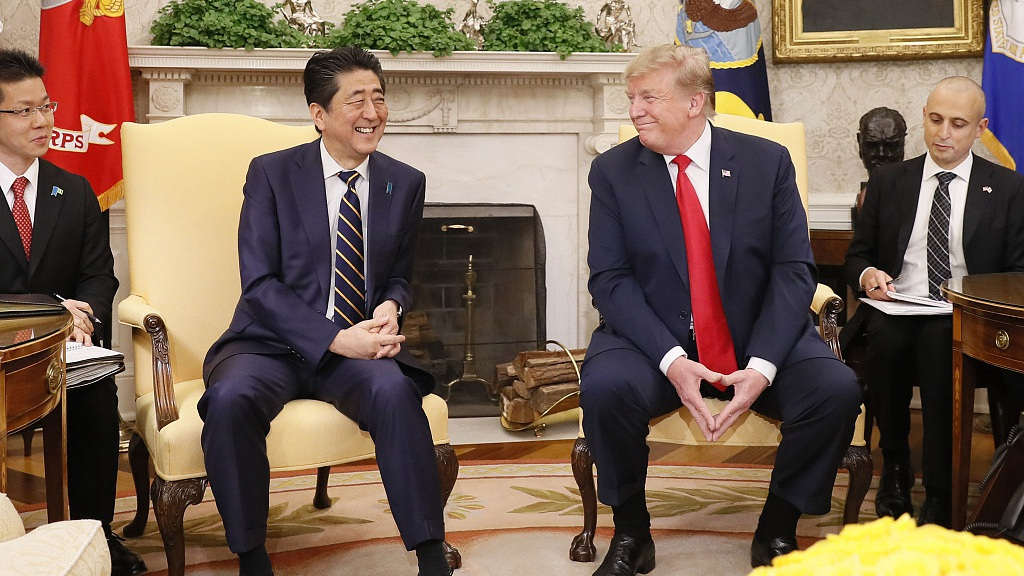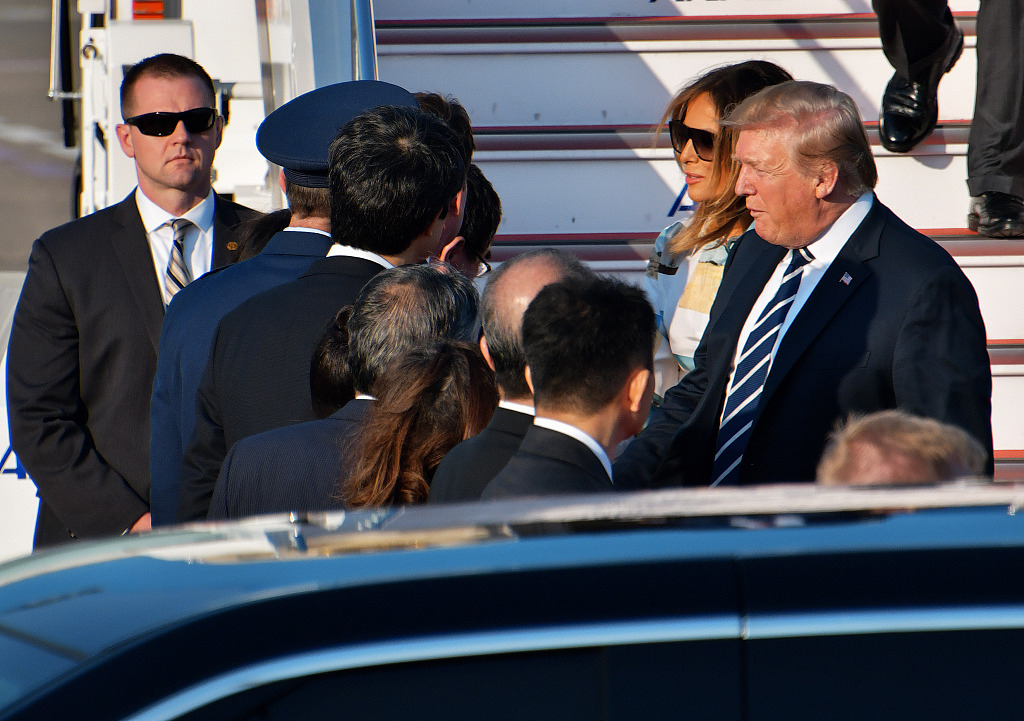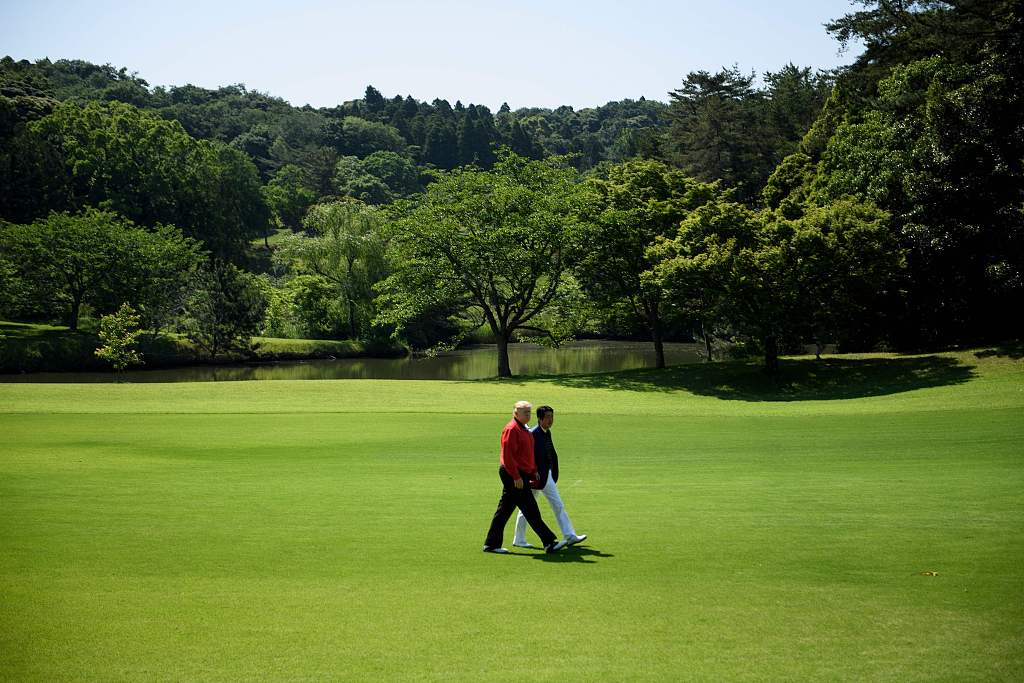
Opinion
10:08, 26-May-2019
Abe, Japan's flatterer-in-chief
Chris Deacon

Editor's note: Chris Deacon is a postgraduate researcher in politics and international relations at the University of London and previously worked as an international commercial lawyer. The article reflects the author's views, and not necessarily those of CGTN.
As U.S. President Donald Trump arrives in Japan this weekend, a lavish itinerary awaits him. This is no accident. Japanese Prime Minister Shinzo Abe has consistently used flattery and prestige to try to build a friendship with Trump that might influence U.S. policy to Tokyo's liking. This trip will see some of the clearest examples of Abe's tactics yet – but are they actually working?
Trump's activities in Japan will include cultural extravaganzas designed to impress. On Sunday, he and Abe will attend the grand sumo tournament taking place in Tokyo, viewing the bouts from ringside seats of honor. Of course, Trump will not be expected to sit on floor cushions as tradition dictates, but will instead be afforded a comfortable chair.

U.S. President Donald Trump and First Lady Melania arrive at Tokyo International Airport in Tokyo, Japan, May 25, 2019. /VCG Photo
U.S. President Donald Trump and First Lady Melania arrive at Tokyo International Airport in Tokyo, Japan, May 25, 2019. /VCG Photo
Just to impress upon the U.S. president quite how important and beloved he is, however, Trump will then present the trophy to the winner of the tournament – a trophy which the organizers have gone so far as to name in his honor.
The stakes will then be raised the following day when Trump will be afforded a meeting with the recently ascended Emperor Naruhito – the first foreign head of state to receive this privilege. Trump has already shown his approval of this honor by saying that his trip will involve the most exciting events in Japan for over two hundred years – likely a somewhat confused reference to the last time a Japanese emperor abdicated the throne.
Such overtures are nothing new for the Abe-Trump relationship. While UK Prime Minister Theresa May was the first foreign leader to make a formal visit to the U.S. to meet Trump after his inauguration, Abe was the first to meet Trump after Trump's election victory in 2016. Pictures showed the Japanese Prime Minister seemingly beaming with joy as he sat among the golden splendor of Trump Tower with its victorious owner.

Japan's new Emperor Naruhito attends the "Kenji-to-Shokei-no-Gi" ceremony to inherit the three sacred treasures of the Imperial Family at the Imperial Palace in Tokyo, Japan, on May 1, 2019. /VCG Photo
Japan's new Emperor Naruhito attends the "Kenji-to-Shokei-no-Gi" ceremony to inherit the three sacred treasures of the Imperial Family at the Imperial Palace in Tokyo, Japan, on May 1, 2019. /VCG Photo
The two leaders have also famously been regular practitioners of “golf diplomacy” – a sport Abe knows is close to Trump's heart. When the two men played together in Japan last year, Abe even treated his counterpart to cheeseburgers and fries, recognizing that such culinary delights might be more to Trump's liking than other, more traditional Japanese cuisine.
In addition to this somewhat intimate facetime, it has even been reported that Abe formally wrote to the Nobel Peace Prize committee to support the U.S. President being awarded the honor for his efforts in achieving peace on the Korean peninsula.
In this regard, perhaps more so than any other world leader, the Japanese Prime Minister has attempted to win over Donald Trump not necessarily with policy arguments or conventional diplomacy, but with flattery and skillful understanding of Trump's tastes.
Such a policy might not have been particularly attractive for the likes of President Obama, or others before him, because of the extent to which decision-making power within the White House was decentralized to a well-functioning team.
As for the current Oval Office occupant, however, it has become well understood that Trump is capable of whimsical shifts in policy with little oversight or control from those around him. In this way, he is acting out perhaps one of the most personal presidencies in recent U.S. history.
Abe appears to have been acutely aware of this possibility from the outset, and has developed his entire strategy with the U.S. President around this understanding; influencing a personal presidency requires a personal relationship. Per this logic, you must win over Trump the man before you might try to influence his decision-making.

Japan's Prime Minister Shinzo Abe (R) talks with U.S. President Donald Trump before playing a round of golf at Mobara Country Club in Chiba, Japan, May 26, 2019. /VCG Photo
Japan's Prime Minister Shinzo Abe (R) talks with U.S. President Donald Trump before playing a round of golf at Mobara Country Club in Chiba, Japan, May 26, 2019. /VCG Photo
The extent to which this strategy has actually borne fruit, however, is debatable. Trump's aforementioned whimsy means, even where he likes a world leader personally, he can be won over to a different point of view at seemingly a moment's notice. This has been evident in his denouncement of Japanese trade practices, despite his cordial relations with Abe.
Even more importantly, it is difficult to see how Abe's tactics have resulted in policy shifts in Japan's favor thus far. On trade, Trump still threatens tariffs on Japanese auto imports if the two countries cannot reach a trade deal to the U.S. President's liking. And on security policy, Trump still speaks warmly of Kim Jong Un, despite significant concerns on the part of Tokyo.
When it comes to U.S.-Japan relations, Abe has become the flatterer-in-chief. His exploits in molding a friendship with Trump appear to have been highly successful. But this means little for the Japanese Prime Minister if it does not translate into significant influence over relevant U.S. policy decisions.
Over the next few days, Abe will be hoping he can bridge this gap in his diplomatic efforts – otherwise these various endeavors will have likely been in vain.
(If you want to contribute and have specific expertise, please contact us at opinions@cgtn.com)

SITEMAP
Copyright © 2018 CGTN. Beijing ICP prepared NO.16065310-3
Copyright © 2018 CGTN. Beijing ICP prepared NO.16065310-3